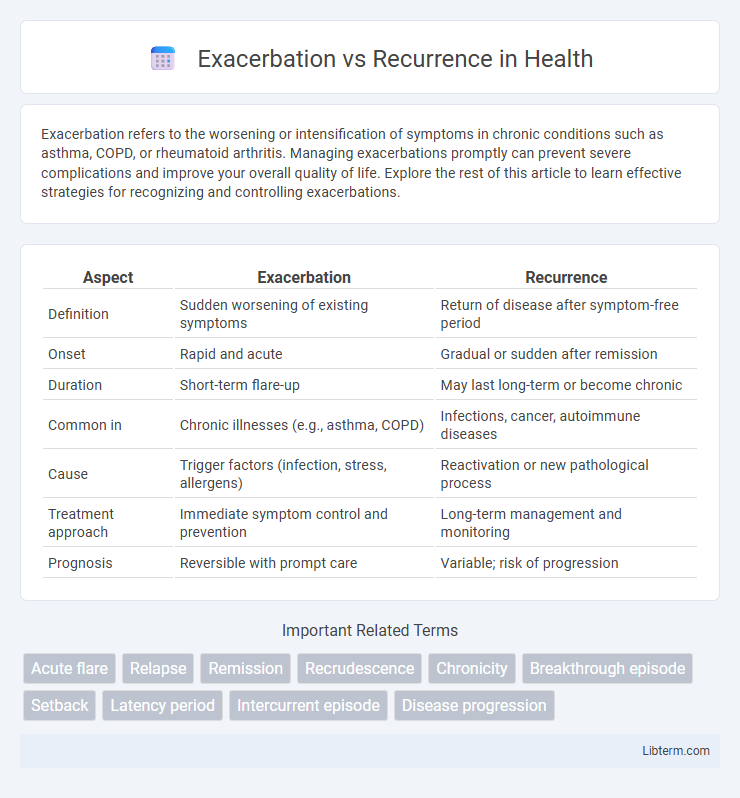Exacerbation refers to the worsening or intensification of symptoms in chronic conditions such as asthma, COPD, or rheumatoid arthritis. Managing exacerbations promptly can prevent severe complications and improve your overall quality of life. Explore the rest of this article to learn effective strategies for recognizing and controlling exacerbations.
Table of Comparison
| Aspect | Exacerbation | Recurrence |
|---|---|---|
| Definition | Sudden worsening of existing symptoms | Return of disease after symptom-free period |
| Onset | Rapid and acute | Gradual or sudden after remission |
| Duration | Short-term flare-up | May last long-term or become chronic |
| Common in | Chronic illnesses (e.g., asthma, COPD) | Infections, cancer, autoimmune diseases |
| Cause | Trigger factors (infection, stress, allergens) | Reactivation or new pathological process |
| Treatment approach | Immediate symptom control and prevention | Long-term management and monitoring |
| Prognosis | Reversible with prompt care | Variable; risk of progression |
Understanding Exacerbation and Recurrence
Exacerbation refers to a sudden worsening or flare-up of existing symptoms in chronic diseases, often triggered by infections or environmental factors. Recurrence involves the return of a disease or symptoms after a period of remission, indicating persistence or reactivation of the underlying condition. Understanding the distinction is crucial for effective management and treatment strategies in chronic conditions like asthma or multiple sclerosis.
Key Definitions: Exacerbation vs Recurrence
Exacerbation refers to the acute worsening or intensification of symptoms in a chronic disease, such as asthma or chronic obstructive pulmonary disease (COPD), resulting in increased severity and impaired function. Recurrence denotes the return of a disease or symptoms after a period of remission or apparent recovery, commonly seen in infections or conditions like cancer. Distinguishing exacerbation from recurrence is crucial for accurate diagnosis, treatment planning, and prognosis assessment in clinical practice.
Causes of Exacerbation
Exacerbation refers to the sudden worsening of symptoms in chronic conditions, often triggered by infections, environmental factors, or non-adherence to treatment. Common causes include respiratory infections, allergens, air pollution, and stress, which can intensify the inflammatory response and lead to symptom escalation. Understanding these triggers is crucial for preventing and managing exacerbations effectively.
Causes of Recurrence
Recurrence in medical conditions often results from incomplete treatment, persistent underlying disease processes, or re-exposure to causative factors such as infections, allergens, or lifestyle triggers. Genetic predispositions and immune system dysfunctions can also contribute to disease recurrence by impairing the body's ability to fully eliminate or control the condition. Identifying and mitigating these causes is critical to prevent repeated episodes and improve long-term patient outcomes.
Clinical Signs and Symptoms
Exacerbation in clinical signs and symptoms refers to the sudden worsening or intensification of disease manifestations, such as increased shortness of breath, heightened cough severity, and amplified pain levels. Recurrence involves the reappearance of symptoms after a period of remission or apparent resolution, often with similar intensity and clinical features as the initial episode. Differentiating exacerbation from recurrence is critical for accurate diagnosis and targeted treatment strategies in chronic conditions like asthma, COPD, and infections.
Diagnosis: Distinguishing Exacerbation from Recurrence
Diagnosis of exacerbation versus recurrence hinges on clinical presentation and temporal patterns; exacerbation involves a sudden worsening of existing symptoms, while recurrence indicates the return of symptoms after a period of remission. Diagnostic tools such as patient history, symptom chronology, and biomarkers are critical in differentiating the two conditions. Imaging and laboratory tests further aid in identifying active disease versus new onset, ensuring accurate treatment strategies.
Risk Factors and Triggers
Exacerbation involves the sudden worsening of symptoms, often triggered by infections, environmental pollutants, or poor medication adherence, which increase inflammation and airway hyperresponsiveness. Recurrence refers to the repeated occurrence of disease episodes influenced by underlying chronic conditions, genetic predisposition, and lifestyle factors such as smoking or allergen exposure. Both processes share overlapping risk factors, but exacerbations are typically acute events triggered by external stimuli, whereas recurrences stem from persistent underlying vulnerabilities.
Treatment Approaches for Exacerbation and Recurrence
Treatment approaches for exacerbation primarily involve prompt administration of corticosteroids and bronchodilators to reduce airway inflammation and improve airflow, often requiring hospitalization in severe cases. Recurrence management emphasizes long-term maintenance therapy, including inhaled corticosteroids and lifestyle modifications, to prevent further episodes and maintain disease control. Both strategies require tailored patient monitoring to optimize therapeutic outcomes and reduce healthcare utilization.
Prevention Strategies
Exacerbation prevention strategies primarily involve strict adherence to medication regimens, lifestyle modifications, and prompt management of early symptoms to avoid acute worsening of chronic conditions. In contrast, recurrence prevention emphasizes long-term risk factor modification, continuous monitoring, and comprehensive rehabilitation programs to minimize the chances of disease relapse. Both approaches rely heavily on patient education, regular clinical follow-ups, and tailored interventions targeting underlying causes to improve overall health outcomes.
Prognosis and Long-Term Management
Exacerbation involves a sudden worsening of symptoms in chronic diseases, often requiring immediate intensification of treatment to stabilize the patient, while recurrence refers to the return of disease after a period of remission, necessitating reassessment of long-term management strategies. Prognosis in exacerbations depends on prompt intervention and severity, whereas recurrent episodes signal the need for ongoing monitoring and possibly modifying maintenance therapies to prevent future flare-ups. Effective long-term management focuses on controlling underlying causes, optimizing medication adherence, and regular follow-up to reduce morbidity and improve patient outcomes.
Exacerbation Infographic

 libterm.com
libterm.com